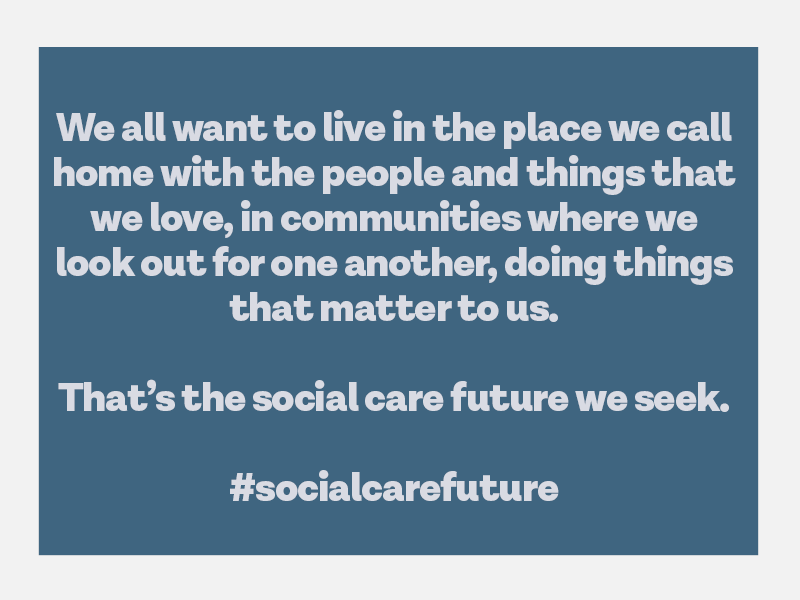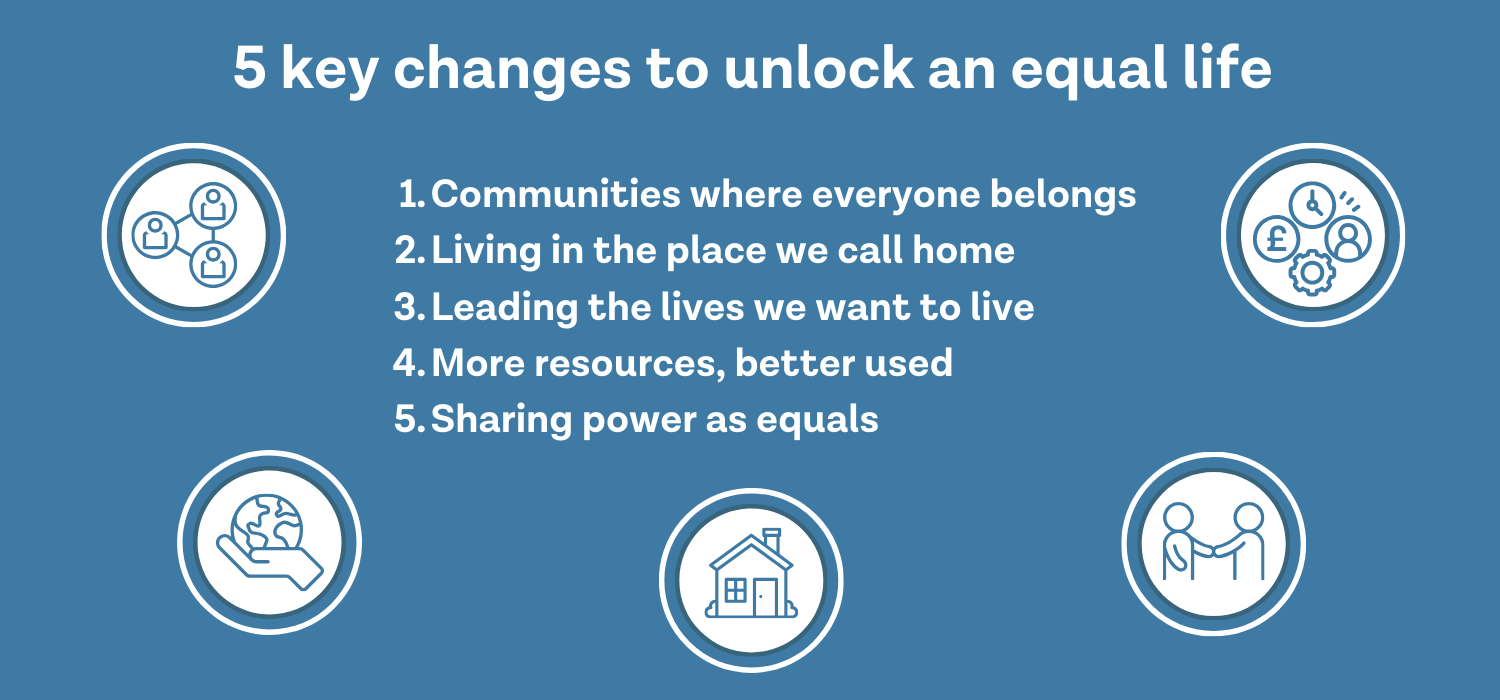Introduction
Explore how this Evidence Review was co-produced and what the five key changes are to unlock an equal life for those who draw on adult social care.
Explore how this evidence review was co-produced, and what the five key changes are to unlock an equal life for those who draw on adult social care.
The power of co-production
Why is co-production an essential part of sharing power?
 Simply speaking it [co-production] is the oil that makes it [power-sharing] happen and turns it into a reality... Without ‘Co-Pro’ there can be no sharing of power. Rightly so, this is now becoming key standard practice in many ‘public facing’ organisations. Though it is crucial for this to happen at every level within those organisations, for it truly to be effective. Co-Pro embraces diversity and the notion that everyone has a valid opinion/contribution to make… The qualities, strengths and intelligence of disabled people need to be recognised alongside their life experiences.
Simply speaking it [co-production] is the oil that makes it [power-sharing] happen and turns it into a reality... Without ‘Co-Pro’ there can be no sharing of power. Rightly so, this is now becoming key standard practice in many ‘public facing’ organisations. Though it is crucial for this to happen at every level within those organisations, for it truly to be effective. Co-Pro embraces diversity and the notion that everyone has a valid opinion/contribution to make… The qualities, strengths and intelligence of disabled people need to be recognised alongside their life experiences.
(Dean Thomas, Group member)
The Evidence Review is grounded in and shaped by the experiences, knowledge and preferences of the people involved. People brought many different experiences to the discussions - group members included disabled people, people with long-term health conditions, older people, people who had experienced mental health challenges, and people with current or past caring roles.
However, people brought more than their lived experience of social care to the project – their other life experiences, areas of knowledge, and diverse opinions are all part of this Evidence Review, too. Throughout, you’ll find direct quotes from group members and video material that will give you a real flavour of the discussions that underpinned this evidence review.
This resource is not only an accessible and unique commentary of the research on adult social care, it contains several practical suggestions of things you can do in your own role – whether that’s direct practice, supervising others, or working in commissioning or senior management. It can also be used at a national level, in order to make a case for political and policy changes; and to promote the effectiveness of co-production itself.
We were all very keen to make this an active resource. As one group member commented:
I read a lot of reports all written to high standards, but they don’t relate to people. More importantly, what’s the point, what’s the outcome, and did we learn or improve anything?
It’s also hoped that, if you already engage with social care services yourself, you will find the material helpful, and will be able to use it to make a case for changes in your local area.
The five key changes

Social Care Future define themselves as ‘…a growing movement of people with a shared commitment to bring about major positive change in what is currently called ‘social care’.’ As part of their 2021 'Whose Social Care Future Is It Anyway?' inquiry, Social Care Future developed a vision of social care (see above). Anna Severwright, one of the inquiry’s convenors, stated clearly in her introduction to the inquiry’s report that: Too often the debates and decisions about social care are happening behind the scenes without us – the people who draw on social care - or we are invited as an afterthought or just as a ‘tick box’. Well, we have had enough of that.
(Social Care Future, 2021, p6)
As part of the inquiry, and via a survey and online sessions, Social Care Future asked people about their experiences. They gathered more than five hundred responses. From what people said, Social Care Future developed Five Key Changes: …things that we think if they happened would move us towards experiencing Social Care Future’s vision in our lives.

In this Evidence Review, we use these five key changes as our starting point. In each of the sections, you will find a plethora of research that can offer insights and support for these key changes – making a compelling economic (as well as an ethical) case for all those who work in social care to take action now and in the future to unlock an equal life for all who draw on social care.
What we did together
Research in Practice Evidence Reviews aim to be comprehensive. Previous evidence reviews, such as Ageing well and Working with complexity have thoroughly investigated the research on their subject, using recognised experts in the field to write chapters around key aspects of the topic. In this review, the group members are the experts, and the interpretations and ideas are theirs.
This Evidence Review is also purposefully wide-ranging. One group member said that we should: embrace it… instead of putting things in little boxes, it feels right that we should try to make it all-encompassing.
Through a series of 25 meetings (five for each key change), small groups got together online and discussed a series of research papers relevant to their topic. Inevitably, discussions and debates were varied and diverse, group members bouncing off one another and sharing experiences. Much of the research contained in this Evidence Review was directly discussed by the group, and some was identified by group members; some was picked up later by the project’s coordinator, Jeanette Sutton, to elaborate on the themes picked up by the groups. Research was identified through database searches, such as Social Care Online, using key words identified by the groups in discussion.
The context
This project took place over 2022, a period of economic and political turmoil in the UK. The cost of living increased rapidly throughout the year, with inflation peaking at 11.1% in October 2022 (Harari et al., 2022). The cost of living crisis has not abated in 2023, with inflation continuing to run at historically high levels.
It is well-established that disabled people and their households are disproportionately affected by inflation: household income is, on average, lower, and there are often additional costs in food and energy – two of the main drivers of the current increase in the cost of living (Weston, 2022). According to a 2023 survey by the charity Euan’s Guide, disabled people are frequently opting to reduce their use of medical aids and equipment, which often consume large amounts of energy – or, where this is impossible, cutting back drastically on food, heating and travel.
Furthermore, with two changes of Prime Minister, plans announced in January 2022 to fund some changes via a Health and Social Care Levy on National Insurance were withdrawn in September of that same year. While the group discussions tried to avoid party politics, the wider point was made by most of the groups that this was a symptom of a wider issue: that the cross-party recognition that social care is important hasn’t been matched by action to address the issues in the sector. There was also some frustration that, often in the public narrative, it was seen as ‘…and social care‘ (as in ‘health and social care‘). The group discussing More Resources, Better Used, in particular, explored this theme in some detail.
Inevitably, questions and issues we started out with changed over the course of our meetings. Some research we looked at seemed ever-more outdated as we were taken over by events. One Leading The Lives We Want To Live group member spoke for many when she said that: the sky has darkened. By responding to events and discussing current concerns alongside the research, the groups felt that this project would accurately represent the changes and struggles that were impacting on people’s lives.
How to use this Evidence Review
A memorable comment from the More Resources, Better Used group was that: there is an imbalance between the amount of research conducted, and the action taken on it. In this evidence review, we are trying to address that. For each key change, we have compiled a wealth of research and commentary that explores and supports the topic. You’ll notice some ‘golden threads’ that appear more than once in different key changes, such as co-production and legal literacy. Each group had a slightly different take on similar topics, and you can navigate easily through these. You’ll also find summaries of key messages which will help you easily find the critical themes discussed by the groups.
But this evidence review is not just there to be read. It is a call to action!
There are dozens of action points and reflective points in the sections titled ‘What you can do’. Everyone is encouraged to find action points that are relevant to them, consider how they can be achieved, and commit to making changes. Share what you will do with colleagues. Look to the future and think about how your actions will have a direct impact on the lives of the people you work with. In the concise words of a member of the Sharing Power As Equals group:
Make time. Take an interest.
The appetite for change is strong among citizens! The worst thing we can do, is to do nothing, as a member of the More Resources, Better Used group said.
If you are someone who draws on social care yourself, please share this resource with any workers you know – pointing out anything you particularly agree with, or changes you think could have a powerful impact locally. Everyone who created this resource would be incredibly gratified to know that you draw power from their words and can use it to argue for change in your local area.
A message for people with care and support needs
Here Iggy Patel shares a message for people with care and support needs.
Sharing your changes
Research in Practice would love to hear from all those who use this evidence review and are inspired to make changes to their practice, their service, or their organisation – and have seen the effects. Perhaps, in the spirit of co-production, you could contact us jointly with someone with care and support needs? We would be keen to feature your stories in podcasts and blogs.
Let’s share and encourage one another. As a group member said: it’s really important to celebrate the outcomes of co-production!
What is the one thing you would most like to change about social care?
The removal of bureaucracy / insist everything is co-created / co-produced right from the start.
(Dean Thomas, Group Member)
Why is communication and accurate information so important?
In this clip, Dave Bracher explains why communication and accurate information are so important.
References
Harari, D., Francis-Devine, B., Bolton, P., & Keep, M. (2023). Rising cost of living in the UK: Research Report. House Of Commons Library.
Social Care Future (2021). Whose Social Care is it Anyway? From permanent lockdown to an equal life. In Control Partnerships.
Social Care Future (2022). Towards An Equal Life: From there to here. What next for Social Care Future? In Control Partnerships.
Weston, T. (2022). Cost of Living: Impact of rising costs on disabled people. House of Lords Library.

